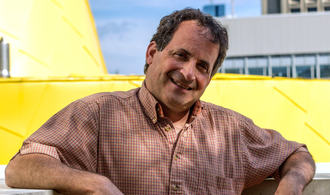One day, a visiting researcher came to present his work to Professor Eytan Modiano's group. He started by outlining the assumptions he made when creating his mathematical model, and he never got further than that.
The students in Eytan's group started questioning the researcher's modeling assumptions, trying to understand the way the problem was framed. What started as a full presentation morphed into an in-depth discussion of just those first few slides. Frustrating as it might sound, what the students were doing -- questioning what they didn't understand and fully investigating the assumptions involved -- illustrated one of the values Eytan is proud to see in his students. He remembers a conversation he had with one of his graduate students shortly after that presentation. What the student said stuck with him. "One thing about this research group is that we spend most of our time modeling the problem and making sure we ask the right question before we answer it," Eytan recalls the student saying, "I was very flattered to hear that. That's exactly what I like to see as a value in my students." One of the great things about being a professor, according to Eytan, is watching how students evolve and grow as they pass through his lab. At the start, some are unsure and immature. But by the time they graduate, they are confident and capable of conducting their own research, ready to direct their own lines of inquiry. They are colleagues, ready to take their place in a growing field of research.
The Internet, as we know it, is only about twenty years old. But in those decades, it has changed the way we work and the way we live our lives. Eytan's field is communications and network research. He and his students design the architecture for data communication, be it via wireless, satellite, or optical networks. His work involves refining and reimagining the technology behind the communication networks that run our world, by combining techniques from disciplines like graph theory, optimization, and queuing theory. Consider, for example, wireless networks. We use wireless networks to connect electronic devices for personal communications, sensing, command and control of systems, and even coordinating fleets of autonomous vehicles. To design an efficient ad hoc network -- a specific type of decentralized wireless network in which each node forwards data for other nodes and the topology of the network changes dynamically -- you need to use multiple techniques. You need graph theory to design routing algorithms that determine the path a message takes as it flows from source to destination. You need optimization to design the scheduling algorithms that dictate which nodes transmit information on specific frequencies at specific times. You need queuing theory to analyze the network's performance in terms of throughput and delay.
Out of necessity, Eytan has relatively deep knowledge of several techniques. That's the only way he's able to do this kind of theoretical, broad research. But he didn't always have such fundamental research work in his sights. Before coming to LIDS, Eytan worked at MIT's Lincoln Laboratory. "When I was at Lincoln Lab, I read the papers of academic researchers and tried to learn from those papers and apply the techniques to the systems that we were developing at the lab," said Eytan, "But what I really wanted was to be one of those people writing the fundamental research papers." So he joined LIDS. At that time, some fifteen years ago, there weren't many MIT researchers working in the area of communication networks. But most were working at LIDS, and LIDS had a history of pioneering contributions in this area. Over the years, as Eytan has seen the lab grow, he's learned a lot about how to juggle the two primary demands of an academic environment: research and teaching. "For research, I need to think years ahead, about the important problems coming five or ten years down the line, and go and get funding for them." said Eytan, "For teaching, I need to think about what I have to do at 11 AM." Teaching can be difficult to do, but it's easy to prioritize. Right on schedule, every week, the lecture hall is filled with students, waiting for you. Comparatively, getting funding for and conducting research is more like a low hum in the background, rarely urgent but always important. The trick, as with so many things in life, is setting priorities. "It's not merely about hard work," said Eytan, "I'm associate department head in Aero-Astro at MIT, and there are a lot of responsibilities...all very important things. They're always urgent and they always need you. But if I were to do that I would not get any research done. I would not be able to support my students. I make a point that this is critical and I block out time for research that's not interruptible." By all indications, his system of setting priorities works. In the last decade and a half, Eytan has risen through the ranks from assistant to full professor at MIT, served as associate editor for a number of peer-reviewed journals, been on the planning committee for conferences, and become an Institute of Electrical and Electronics Engineers (IEEE) fellow and an associate fellow of American Institute of Aeronautics and Astronautics (AIAA).
One of the up-and-coming important problems that Eytan is looking at is network resilience. He plans to study how networks react to natural disaster, attack, or catastrophic failures. "Today's world is increasingly controlled by computers and depends on communications and the Internet," said Eytan, "I'm looking at the possible vulnerabilities that might arise from that."
When he isn't working, Eytan travels with his wife and two children. He likes to go off the beaten path, exploring places like Central America, Southeast Asia, and Africa. "I like to travel to places that have a lot of nature and wildlife," said Eytan, "If you're in Africa on a safari, you're not going to have an easy time thinking about graph theory. I think that the biggest challenge of being a professor at MIT is being able to separate, and get your work out of your mind." Cooking is another activity that Eytan truly enjoys. It is a creative outlet that allows him to clear his mind from work. He specializes in Mediterranean and Middle Eastern Cuisine, replicating many of his mother's traditional recipes. He prepares all of the family meals, and enjoys hosting friends and family for dinners. As much as he travels, and values spending time with his family, Eytan seems satisfied with the place his work has in his life. He enjoys the process of mentoring students and knowing that he's doing meaningful, fundamental research.




